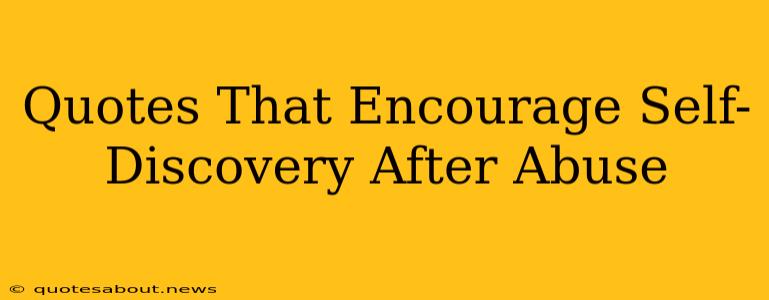The journey of self-discovery after experiencing abuse is long and complex, filled with both immense challenges and incredible potential for growth. Finding the strength to heal and rebuild your life requires courage, resilience, and unwavering self-compassion. While there's no magic bullet, the right words at the right time can provide a crucial spark of hope and inspiration. This article explores powerful quotes designed to nurture self-discovery and healing after abuse, alongside answering frequently asked questions about the process.
Understanding the Path to Self-Discovery After Abuse
Before diving into the inspiring quotes, it's crucial to acknowledge the profound impact of abuse. The emotional, psychological, and sometimes physical scars can run deep, leaving individuals feeling lost, broken, and unsure of their identity. Self-discovery in this context isn't simply about finding a new hobby; it's about reclaiming your sense of self, redefining your worth, and establishing healthy boundaries. It's a process of healing, re-learning, and empowering yourself to build a life free from the shadows of past trauma.
Powerful Quotes for Healing and Self-Discovery
These quotes, carefully selected for their power and relevance, aim to offer comfort, strength, and hope during the journey of recovery:
-
"The wound is the place where the Light enters you." - Rumi: This beautiful quote speaks to the transformative power of pain. While abuse leaves deep wounds, it also creates an opportunity for profound growth and self-understanding. The "light" represents the potential for healing, strength, and a renewed sense of self.
-
"What lies behind you and what lies in front of you, pales in comparison to what lies inside of you." - Ralph Waldo Emerson: This quote emphasizes the inner strength and resilience you already possess. The past trauma and the uncertain future are less important than the inherent capacity for healing and growth within you.
-
"Self-compassion is not self-indulgence. It’s about being kind to yourself, especially when you’re struggling." - Kristin Neff: Self-compassion is crucial after abuse. You need to treat yourself with the same understanding and care you'd offer a loved one facing similar challenges. This is vital for fostering healing and building a healthy relationship with yourself.
-
"The best revenge is massive success." - Frank Sinatra: While not directly addressing the emotional aspects of abuse, this quote highlights the power of rebuilding your life. Focusing on personal growth and achieving your goals can be a powerful form of self-empowerment and healing.
-
"You are braver than you believe, stronger than you seem, and smarter than you think." - A.A. Milne: This quote is a potent reminder of your inner resources. Even when feeling weak and vulnerable, your inherent strength and resilience can carry you through the healing process.
Frequently Asked Questions (FAQs)
What are the first steps towards self-discovery after abuse?
The first steps involve prioritizing your safety and well-being. This may include seeking professional help from a therapist or counselor specializing in trauma, creating a support network, and establishing healthy boundaries. Gentle self-care practices, such as mindfulness or spending time in nature, can also be beneficial.
How long does it take to recover from abuse?
Recovery is a unique and personal journey. There's no set timeline. Be patient with yourself and celebrate small victories along the way. Professional support can help guide you through the process and ensure you're taking the right steps at your own pace.
How can I forgive myself after abuse?
Self-forgiveness is a crucial part of the healing process, though it often takes time and effort. It involves acknowledging the role of abuse in shaping your experience, understanding that you are not to blame, and practicing self-compassion. Therapy can be incredibly valuable in navigating this complex emotional journey.
What are some resources available for victims of abuse?
Numerous resources are available to help victims of abuse, including national hotlines, local support groups, and online communities. It's essential to find the right support system that meets your individual needs and preferences. Your therapist or doctor can provide information about local resources.
Is it normal to feel confused or lost after abuse?
Yes, it's entirely normal to feel confused, lost, and even disoriented after abuse. The experience can fundamentally disrupt your sense of self and your understanding of the world. Acknowledging these feelings and seeking support are crucial steps in the healing process.
Conclusion
The journey of self-discovery after abuse is a testament to human resilience and the incredible capacity for healing. While the path may be challenging, the potential for growth and a renewed sense of self is immense. Remember to embrace self-compassion, seek support, and draw strength from the inspiring words of others who have traveled a similar road. The quotes provided here serve as a beacon of hope, reminding you of your inner strength and your inherent capacity to heal and thrive.

